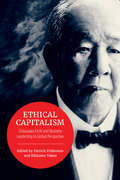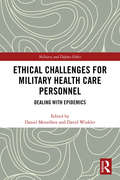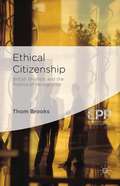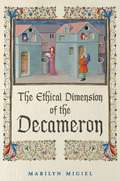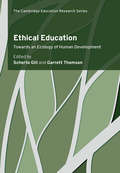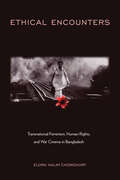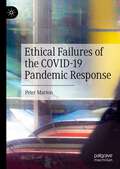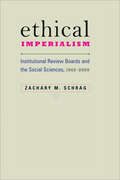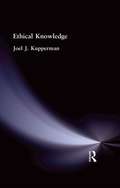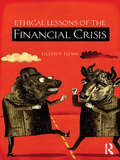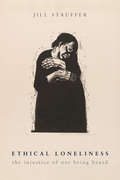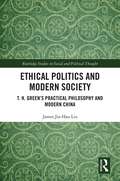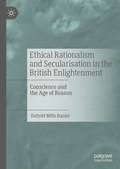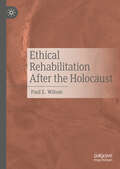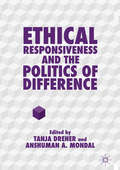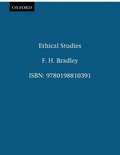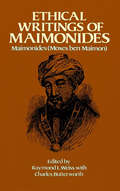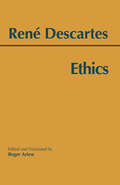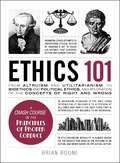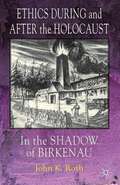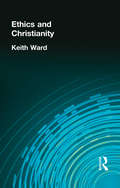- Table View
- List View
Ethical Capitalism: Shibusawa Eiichi and Business Leadership in Global Perspective
by Kikkawa Takeo Patrick FridensonShibusawa Eiichi (1840–1931) was a Japanese banker and industrialist who spearheaded the modernization of Japanese industry and finance during the Meji Restoration. He founded the first modern bank in Japan and his reforms introduced double entry accounting and joint-stock corporations to the Japanese economy. Today, he is known as the “father of Japanese capitalism.” Ethical Capitalism is a volume of essays that tackles the thought, work, and legacy of Shibusawa Eiichi and offers international comparisons with the Japanese experience. Eiichi advocated for gapponshugi, a principle that emphasized developing the right business, with the right people, in service to the public good. The contributors build a historical perspective on morality and ethics in the business world that, unlike corporate social responsibility, concentrates on the morality inside firms, industries, and private-public partnerships. Ethical Capitalism is not only a timely work; it is a necessary work, in a rapidly globalizing world where deregulation and lack of oversight risk repeating the financial, environmental, and social catastrophes of the past.
Ethical Challenges for Military Health Care Personnel: Dealing with Epidemics (Military and Defence Ethics)
by Daniel Messelken David WinklerThis book examines the issue of ethics in the context of the provision of military health care in an epidemic. Outbreaks of epidemics like Ebola trigger difficult ethical challenges for civilian and military health care personnel. This book offers theoretical reflections combined with reports from recent military and NGO missions in the field. The authors of this volume focus on military medical ethics adding a distinct voice to the topic of epidemics and infectious diseases. While military health care personnel are always crucially involved during disaster relief operations and large-scale public health emergencies, most of the current literature treats ethical issues during epidemics from a more general perspective without taking into account the specifics of the military context. The contributions in this volume provide first-hand insights into some of the ethical issues encountered by military health care personnel in missions during the Ebola outbreak in 2014/2015. This practical perspective is complimented by academic analyses and theoretical reflections on ethical issues associated with epidemics. This book will be of much interest to students of military studies, ethics and African politics.
Ethical Citizenship
by Thom BrooksCitizenship has come under increasing strain in the face of globalization. Our world gets ever smaller while it sometimes seems our borders are becoming ever more closed. What is citizenship and how can it be ethical? Should citizens owe each other special duties denied to non-citizens? How might theories about citizenship impact on our practices? Ethical Citizenship rediscovers a significant and distinctive contribution to how we might understand citizenship today in the first full length examination of this topic. Ethical citizenship is a communitarian relationship between members of a community based around a shared conception of the common good first defended by British Idealists. This book explores its historical roots, contemporary relevance and application to international politics in an engaging work by leading international scholars bringing together theory and practice.
Ethical Dimension of the 'Decameron'
by Marilyn MigielWith The Ethical Dimension of the "Decameron" Marilyn Migiel, author of A Rhetoric of the "Decameron" (winner of the MLA's 2004 Marraro Prize), returns to Giovanni Boccaccio's masterpiece, this time to focus on the dialogue about ethical choices that the Decameron creates with us and that we, as individuals and as groups, create with the Decameron.Maintaining that we can examine this dialogue to gain insights into our values, our biases and our decision-making processes, Migiel offers a view of the Decameron as sticky and thorny. According to Migiel, the Decameron catches us as we move through it, obligating us to reveal ourselves, inviting us to reflect on how we form our assessments, and calling upon us to be mindful of our responsibility to judge patiently and carefully. Migiel's focus remains unabashedly on the experience of readers, on the meanings they find in the Decameron, and on the ideological assumptions they have about the way that a literary text such as the Decameron works. She offers that, rather than thinking about the Decameron as "teaching" readers, we should think about it "testing" them.Throughout, Migiel engages in the masterful in-depth rhetorical analyses, delivered in lively and readable prose, that are her trademark. Whether she is examining the Italian of the Decameron, translations of the Italian into English, commentaries by scholars, newspaper articles, or student essays, she asks us always to maintain an ethical engagement with the words of others.
Ethical Education: Towards an Ecology of Human Development (Cambridge Education Research)
by Garrett Thomson Scherto GillEthical education should help students become more sensitive to the perspectives and experiences of others. However, the field is dominated by the teaching of moral values as a subject-matter, or by the fostering of character traits in students, or by moral reasoning. This book proposes an alternative to these limited moralistic approaches. It places human relationships at the core of ethical education, in its understanding of both ethics and education. With contributions from renowned international scholars, this approach is laid out in three parts. Part I develops the underlying theory of ethics and education; Part II focuses on the relevant pedagogical principles, and Part III provides illustrations of emergent innovative ethical educational practices in worldwide schools. Against a backdrop of divisiveness and apathy, the innovative practices described in this book show how a new vision for ethical education might be centred around caring for students' well-being.
Ethical Encounters: Transnational Feminism, Human Rights, and War Cinema in Bangladesh
by Elora Halim ChowdhuryEthical Encounters is an exploration of the intersection of feminism, human rights, and memory to illuminate how visual practices of recollecting violent legacies in Bangladeshi cinema can conjure a global cinematic imagination for the advancement of humanity. By examining contemporary, women-centered Muktijuddho cinema—features and documentaries that focus on the Bangladesh Liberation War of 1971—Elora Chowdhury shows how these films imagine, disrupt, and reinscribe a gendered nationalist landscape of trauma, freedom, and agency. Chowdhury analyzes Bangladeshi feminist films including Meherjaan, and Itihaash Konna (Daughters of History), as well as socially-engaged films by activist-filmmakers including Jonmo Shathi (Born Together), and Shadhinota (A Certain Liberation), to show how war films of Bangladesh can generate possibilities for gender justice. Chowdhury argues that justice-driven films are critical to understanding and negotiating the layered meanings and consequences of catastrophic human suffering yet at the same time they hint at subjectivities and identities that are not reducible to the politics of suffering. Rather, they are key to creating an alternative and disruptive archive of feminist knowledge—a sensitive witnessing, responsible spectatorship, and just responsibility across time, and space. Drawing on Black and transnational feminist critiques, Chowdhury explores questions around women’s place, social roles, and modes of participation in war as well as the visual language through which they become legible as victims/subjects of violence and agents of the nation. Ethical Encounters illuminates the possibilities of film as a site to articulate an ethics that acknowledges a founding violence of the birth of a nation, recuperates it even if in fragments, and imagines differently the irreconcilable relationship between humanity, liberty, and justice.
Ethical Encounters: Transnational Feminism, Human Rights, and War Cinema in Bangladesh
by Elora Halim ChowdhuryEthical Encounters is an exploration of the intersection of feminism, human rights, and memory to illuminate how visual practices of recollecting violent legacies in Bangladeshi cinema can conjure a global cinematic imagination for the advancement of humanity. By examining contemporary, women-centered Muktijuddho cinema—features and documentaries that focus on the Bangladesh Liberation War of 1971—Elora Chowdhury shows how these films imagine, disrupt, and reinscribe a gendered nationalist landscape of trauma, freedom, and agency. Chowdhury analyzes Bangladeshi feminist films including Meherjaan, and Itihaash Konna (Daughters of History), as well as socially-engaged films by activist-filmmakers including Jonmo Shathi (Born Together), and Shadhinota (A Certain Liberation), to show how war films of Bangladesh can generate possibilities for gender justice. Chowdhury argues that justice-driven films are critical to understanding and negotiating the layered meanings and consequences of catastrophic human suffering yet at the same time they hint at subjectivities and identities that are not reducible to the politics of suffering. Rather, they are key to creating an alternative and disruptive archive of feminist knowledge—a sensitive witnessing, responsible spectatorship, and just responsibility across time, and space. Drawing on Black and transnational feminist critiques, Chowdhury explores questions around women’s place, social roles, and modes of participation in war as well as the visual language through which they become legible as victims/subjects of violence and agents of the nation. Ethical Encounters illuminates the possibilities of film as a site to articulate an ethics that acknowledges a founding violence of the birth of a nation, recuperates it even if in fragments, and imagines differently the irreconcilable relationship between humanity, liberty, and justice.
Ethical Failures of the COVID-19 Pandemic Response
by Péter MartonThis book draws attention to the non-biological—political, economic, societal and cultural—variables shaping both the emergence and persistence of the COVID-19 pandemic and the global response to it, with a particular focus on political decisionmakers’ role in the domestic and international politics surrounding the process of the pandemic. The book identifies the strategic and underlying ethical failures of decision making, using a process-tracing approach to reconstruct considerations, decisions and actions by key leaders—interested in thus weaving a global narrative of the response. The author highlights key speech acts, and interprets the causal implications embedded in a chronological and contextualised appraisal of events, statements and public health measures. The book further discusses the normative ethics of pandemic response, and presents lessons drawn from the present experience. It also offers a normative analysis taking into consideration pre-pandemic guidelines for response, including in the literature of public health ethics and pandemic preparedness plans.
Ethical Imperialism: Institutional Review Boards and the Social Sciences, 1965–2009
by Zachary M. SchragA powerful indictment of the IRB regime.University researchers in the United States seeking to observe, survey, or interview people are required first to complete ethical training courses and to submit their proposals to an institutional review board (IRB). Under current rules, IRBs have the power to deny funding, degrees, or promotion if their recommended modifications to scholars’ proposals are not followed. This volume explains how this system of regulation arose and discusses its chilling effects on research in the social sciences and humanities.Zachary M. Schrag draws on original research and interviews with the key shapers of the institutional review board regime to raise important points about the effect of the IRB process on scholarship. He explores the origins and the application of these regulations and analyzes how the rules—initially crafted to protect the health and privacy of the human subjects of medical experiments—can limit even casual scholarly interactions such as a humanist interviewing a poet about his or her writing. In assessing the issue, Schrag argues that biomedical researchers and bioethicists repeatedly excluded social scientists from rule making and ignored the existing ethical traditions in nonmedical fields. Ultimately, he contends, IRBs not only threaten to polarize medical and social scientists, they also create an atmosphere wherein certain types of academics can impede and even silence others. The first work to document the troubled emergence of today's system of regulating scholarly research, Ethical Imperialism illuminates the problems caused by simple, universal rule making in academic and professional research. This short, smart analysis will engage scholars across academia.
Ethical Knowledge
by Kupperman, Joel JFirst published in 2002. Routledge is an imprint of Taylor & Francis, an informa company.
Ethical Lessons of the Financial Crisis
by Eileen P. FlynnIn the aftermath of the economic crisis of 2008 it is important to ask what ethics has to say to the many stakeholders in the U.S. economy. The crisis in the financial industry, precipitated by the bursting of a bubble in the housing sector, brought the U.S. economy to the brink of a major depression. Government officials, economists and financial executives intervened to implement measures to mitigate the damage, applying their expertise and using their best judgments to rescue the economy. The actions they took required technical competence, pragmatic judgments and controversial decisions. They worked through a crisis to try to prevent a very bad situation from becoming a catastrophe. As events played out in the autumn of 2008, there was little time to reflect on how immoral conduct contributed to the crisis and how financial recovery needs to be built on an ethical foundation. The purpose of this book is to examine the role of ethics in setting things right. In taking a close look at the events of 2008 this book makes an important contribution to business ethics.
Ethical Loneliness: The Injustice of Not Being Heard
by Jill StaufferEthical loneliness is the experience of being abandoned by humanity, compounded by the cruelty of wrongs not being acknowledged. It is the result of multiple lapses on the part of human beings and political institutions that, in failing to listen well to survivors, deny them redress by negating their testimony and thwarting their claims for justice. Jill Stauffer examines the root causes of ethical loneliness and how those in power revise history to serve their own ends rather than the needs of the abandoned. Out of this discussion, difficult truths about the desire and potential for political forgiveness, transitional justice, and political reconciliation emerge. Moving beyond a singular focus on truth commissions and legal trials, she considers more closely what is lost in the wake of oppression and violence, how selves and worlds are built and demolished, and who is responsible for re-creating lives after they are destroyed. Stauffer boldly argues that rebuilding worlds and just institutions after violence is a broad obligation and that those who care about justice must first confront their own assumptions about autonomy, liberty, and responsibility before an effective response to violence can take place. In building her claims, Stauffer draws on the work of Emmanuel Levinas, Jean Améry, Eve Sedgwick, and Friedrich Nietzsche, as well as concrete cases of justice and injustice across the world.
Ethical Politics and Modern Society: T. H. Green’s Practical Philosophy and Modern China (Routledge Studies in Social and Political Thought)
by James Jia-Hau LiuEthical Politics and Modern Society introduces and critically examines British idealist philosopher, Thomas Hill Green, his practical philosophy, and its reception in China between the late nineteenth century and the early twentieth century. As a response to the modernity issue in Great Britain, Green's philosophy, in particular his ethical politics, anticipated a practical solution to the individual alienation issue in modern society. Witnessing the resemblance between Green’s ethical politics and classical Chinese ethical and political thought, some Chinese scholars became inclined to take Green’s thought as an intellectual approach to assimilate Western modernity. While Green and the Chinese scholars both intended to articulate an ethical conception of modern politics in response to the issue of modernity, their results were very different. In this book, James Jia-Hau Liu analyses why modern Chinese scholars introduced Green’s philosophy to China and why the studies of Green’s philosophy in China have since faded away. Modern Chinese scholars, such as Gao Yi-Han, Chin Yueh-Lin, Tang Jun-Yi, Chang Fo-Chuan, and Yin Hai-Guang, are explored in greater detail. The contradictory standings towards modernity between Green and Chinese scholars illustrate how to understand the difference forms of modernity that can be embodied therein. Ethical Politics and Modern Society is a valuable resource to scholars of political philosophy, political theory, history of social and political thought, British idealism, and the work of Thomas Hill Green.
Ethical Rationalism and Secularisation in the British Enlightenment: Conscience and the Age of Reason
by Dafydd Mills DanielThis book reassesses the ethics of reason in the Age of the Reason, making use of the neglected category of conscience. Arguing that conscience was a central feature of British Enlightenment ethical rationalism, the book explores the links between Enlightenment philosophy and modern secularisation, while responding to longstanding criticisms of rational intuitionism and the analogy between mathematics and morals, derived from David Hume and Immanuel Kant. Questioning in what sense British Enlightenment ethical rationalism can be associated with a secularising ‘Enlightenment project’, Daniel investigates the extent to which contemporary, and secular liberal, invocations of reason and conscience rely on the early modern Christian metaphysics they have otherwise disregarded. The chapters cover a rich collection of subjects, ranging from the Enlightenment’s secular legacy, reason and conscience in the history of ethics, and controversies in the Scottish Enlightenment, to the role of British moralists such as John Locke, Joseph Butler and Adam Smith in the secularisation of reason and conscience. Each chapter expertly refines Enlightenment ethical rationalism by reinterpreting its most influential proponents in eighteenth-century Britain – the followers of ‘Isaac Newton’s bulldog’ Samuel Clarke – including Richard Price (Edmund Burke’s opponent over the French Revolution) and John Witherspoon (the only clergyman to sign the US declaration of Independence).
Ethical Rehabilitation After the Holocaust
by Paul E. WilsonGenocide murders innocents in a society, and it leaves behind moral corruption and societal twistedness. A genocide like the Holocaust can happen only if the normative ethical commitments to honor the fundamental right to life are compromised or abandoned. When a society lives through a genocide, the moral imagination of peoples and collectives, their ethical behaviors, and even the underlying social contract become twisted and broken. Societies and individuals caught within a genocide need an ethical rehabilitation to move a post-genocidal society out of its ethical degradation. This book discusses the steps of transitional justice as ethical ways to move individuals and societies away from lingering injustices and toward an equilibrium of justice.
Ethical Responsiveness and the Politics of Difference
by Anshuman A. Mondal Tanja DreherThis edited collection focuses on the ethics, politics and practices of responsiveness in the context of racism, inequality, difference and controversy. The politics of difference has long been concerned with speech, voice and representation. By focusing on the practices and politics of responsiveness—listening, reading and witnessing—the volume identifies vital new possibilities for ethics and social justice. Chapters focus on the conditions of possibility, or listening as ethical praxis; unsettling or disrupting colonial relationships; and ways of listening that highlight non-Western traditions and move beyond the liberal frame. Ethical responsiveness shifts some of the responsibility for negotiating difference and more just futures from subordinated speakers, and on to the relatively more privileged and powerful.
Ethical Studies (Second Edition)
by F. H. BradleyBritish Idealist F. H. Bradley (1846-1924) was one of the most distinguished and influential philosophers of his time. He made contributions to metaphysics, moral philosophy and the philosophy of logic. The author of Appearance and Reality (1893), a classic in metaphysics (also reissued in this series), he rejected pluralism and realism. In this polemic, first published in 1876, Bradley argues against the dominant ethical theories of his time. Essays in this book entitled 'Pleasure for Pleasure's Sake' and 'Duty for Duty's Sake' examine and criticise hedonistic utilitarianism and Kantian ethics respectively. Bradley disagreed with individualism, and in 'My Station and its Duties' he discusses the idea that self-realisation can only be found as part of the social organism. This is a classic ethical work that will be valuable both to those studying the ethical theories discussed, and to those interested in the history of philosophy.
Ethical Writings of Maimonides
by MaimonidesPhilosopher, physician, and master of rabbinical literature, Moses ben Maimon (1135-1204) strove to reconcile biblical revelation with medieval Aristotelianism. His writings, especially the celebrated Guide for the Perplexed, exercised considerable influence on both Jewish and Christian scholasticism and brought him lasting renown as one of the greatest medieval thinkers.This volume contains his most significant ethical works, newly translated from the original sources by Professors Raymond L. Weiss and Charles E. Butterworth, well-known Maimonides scholars. Previous translations have often been inadequate -- either because they were not based on the best possible texts or from a lack of precision. That deficiency has been remedied in this text; the translations are based on the latest scholarship and have been made with a view toward maximum accuracy and readability. Moreover, the long "Letter to Joseph" has been translated into English for the first time.This edition includes the following selections:I. Laws Concerning Character Traits (complete)II. Eight Chapters (complete)III. On the Management of HealthIV. Letter to JosephV. Guide of the PerplexedVII. The Days of the MessiahTaken as a whole, this collection presents a comprehensive and revealing overview of Maimonides' thought regarding the relationship of revelation and reason in the sphere of ethics. Here are his teachings concerning "natural law," secular versus religious authority, the goals of moral conduct, diseases of the soul, the application of logic to ethical matters, and the messianic era. Throughout, the great sage is concerned to reconcile the apparent divergence between biblical teachings and Greek philosophy.
Ethics (Hackett Classics)
by René DescartesThough Descartes never wrote a book specifically devoted to moral philosophy, his thought on ethical matters can be found throughout his correspondence and in parts of his work Passions of the Soul. In 1685, an anonymous editor in London gathered these writings in a textbook devoted to Descartes&’s ethical thought. Roger Ariew has translated, from Descartes&’s original French texts, those selections included in the 1685 volume, adding to those writings an Appendix of relevant materials, including Part III of the Discourse on Method on the provisional morals, a portion of the Preface to the French edition of the Principles of Philosophy on the &“tree&” of philosophy, and portions of additional letters that help to illuminate the background for the correspondence included in the 1685 volume. Ariew&’s insightful Introduction explains the contexts in which Descartes addressed ethical questions, the reasoning behind his reluctance to write specifically about moral issues, and the significance of what this collection of writings reveals.
Ethics 101: From Altruism and Utilitarianism to Bioethics and Political Ethics, an Exploration of the Concepts of Right and Wrong (Adams 101)
by Brian BooneExplore the mysteries of morality and the concept of right and wrong with this accessible, engaging guide featuring basic facts along with an overview of modern-day issues ranging from business ethics and bioethics to political and social ethics.Ethics 101 offers an exciting look into the history of moral principles that dictate human behavior. Unlike traditional textbooks that overwhelm, this easy-to-read guide presents the key concepts of ethics in fun, straightforward lessons and exercises featuring only the most important facts, theories, and ideas. Ethics 101 includes unique, accessible elements such as: -Explanations of the major moral philosophies including utilitarianism, deontology, virtue ethics, and eastern philosophers including Avicenna, Buddha, and Confucius. -Classic thought exercises including the trolley problem, the sorites paradox, and agency theory -Unique profiles of the greatest characters in moral philosophy -An explanation of modern applied ethics in bioethics, business ethics, political ethics, professional ethics, organizational ethics, and social ethics From Plato to Jean-Paul Sartre and utilitarianism to antirealism, Ethics 101 is jam-packed with enlightening information that you can’t get anywhere else!
Ethics After Aristotle
by Brad InwoodFrom the earliest times, philosophers and others have thought deeply about ethical questions. But it was Aristotle who founded ethics as a discipline with clear principles and well-defined boundaries. Ethics After Aristotle focuses on the reception of Aristotelian ethical thought in the Hellenistic and Roman worlds, underscoring the thinker's enduring influence on the philosophers who followed in his footsteps from 300 BCE to 200 CE. Beginning with Aristotle's student and collaborator Theophrastus, Brad Inwood traces the development of Aristotelian ethics up to the third-century Athenian philosopher Alexander of Aphrodisias. He shows that there was no monolithic tradition in the school, but a rich variety of moral theory. The philosophers of the Peripatetic school produced surprisingly varied theories in dialogue with other philosophical traditions, generating rich insight into human virtue and happiness. What unifies the different strands of thought--what makes them distinctively Aristotelian--is a form of ethical naturalism: that our knowledge of the good and virtuous life depends first on understanding our place in the natural world, and second on the exercise of our natural dispositions in distinctively human activities. What is now referred to as "virtue ethics," Inwood argues, is a less important part of Aristotle's legacy than the naturalistic approach Aristotle articulated and his philosophical descendants developed further. Offering a wide range of ways of thinking about ethics from an ancient perspective, Ethics After Aristotle is a penetrating study of how philosophy evolves in the wake of an unusually powerful and original thinker.
Ethics As Foreign Policy: Britain, The EU and the Other (Interventions)
by Dan BulleyEthical foreign policy has often been considered utopian, unrealistic and potentially very dangerous. Dan Bulley argues for a reconceptualisation of ethics as foreign policy, as both look to how we can, and ought to, relate to others. Inspired by the deconstructive thought of Jacques Derrida, Bulley studies the ethical claims of British (1997-2007) and EU (1999-2004) foreign policy. These claims are read against themselves to illustrate their deep ambiguity. A textual analysis of speeches, statements and interviews given by foreign policy makers shows that a responsibility to save ‘Africa’, to protect Iraqis, and to hospitably welcome the Balkans into the EU are also irresponsible, inhospitable and unethical. The author contends that foreign policies making a claim to morality are ethical and unethical, in their own terms, suggesting that while a truly ethical foreign policy remains ultimately unachievable, it does not justify abandoning a responsible relation to others. Rather, a negotiation of ethics as foreign policy suggests potential individual, context-bound decisions which remain open to contestation and permanent critique. Bulley argues that the goal of ethical foreign policy must be maintained as a productive hope of what is neither completely impossible, nor entirely possible.
Ethics During and After the Holocaust: In the Shadow of Birkenau
by John K. RothAbsent the overriding or moral sensibilities, if not the collapse or collaboration of ethical traditions, the Holocaust could not have happened. Its devastation may have deepened conviction that there is a crucial difference between right and wrong; its destruction may have renewed awareness about the importance of ethical standards and conduct. But Birkenau, the main killing center at Auschwitz, also continues to cast a disturbing shadow over basic beliefs concerning right and wrong, human rights, and the hope that human beings will learn from the past. This book explores those realities and the issues they contain. It does so not to discourage but to encourage, not to deepen darkness and despair but to face those realities honestly and in a way that can make post-Holocaust ethics more credible and realistic. The book's thesis is that nothing human, natural or divine guarantees respect for the ethical values and commitments that are most needed in contemporary human existence, but nothing is more important than our commitment to defend them, for they remain as fundamental as they are fragile, as precious as they are endangered.
Ethics and Christianity
by Keith WardFirst published in 2002. Routledge is an imprint of Taylor & Francis, an informa company.
Ethics and Enjoyment in Late Medieval Poetry
by Jessica RosenfeldJessica Rosenfeld provides a history of the ethics of medieval vernacular love poetry by tracing its engagement with the late medieval reception of Aristotle. Beginning with a history of the idea of enjoyment from Plato to Peter Abelard and the troubadours, the book then presents a literary and philosophical history of the medieval ethics of love, centered on the legacy of the Roman de la Rose. The chapters reveal that 'courtly love' was scarcely confined to what is often characterized as an ethic of sacrifice and deferral, but also engaged with Aristotelian ideas about pleasure and earthly happiness. Readings of Machaut, Froissart, Chaucer, Dante, Deguileville and Langland show that poets were often markedly aware of the overlapping ethical languages of philosophy and erotic poetry. The study's conclusion places medieval poetry and philosophy in the context of psychoanalytic ethics, and argues for a re-evaluation of Lacan's ideas about courtly love.
